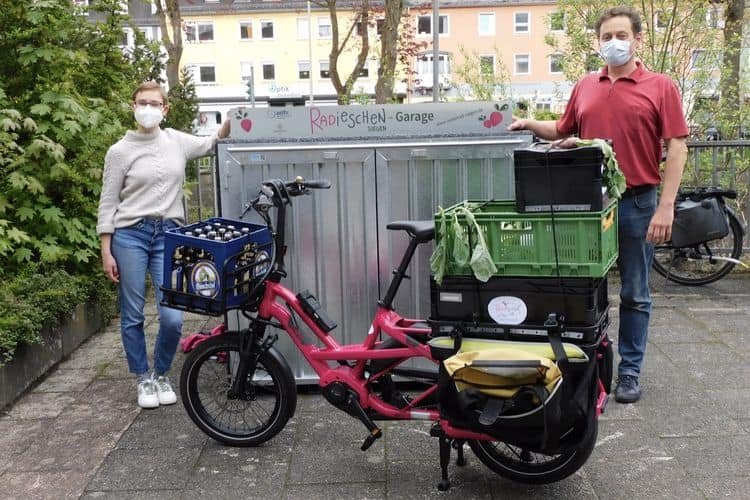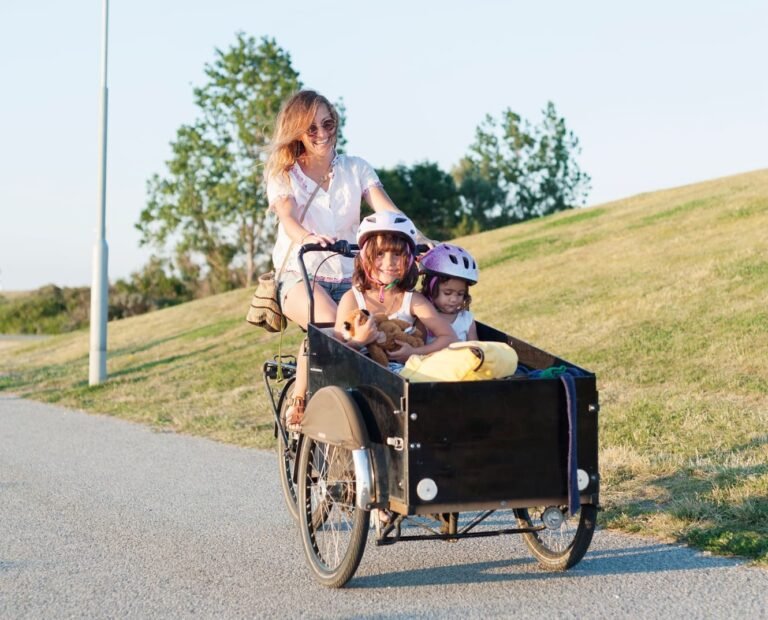L'adozione delle cargo bike in Europa non avviene in modo isolato. Un ecosistema di politiche robusto e ben coordinato a livello di Livelli UE, nazionale e cittadino sta guidando questa transizione, con il supporto di incentivi finanziari, sviluppo di infrastrutture, programmi pilota e partenariati pubblico-privati.. Insieme, queste iniziative creano le condizioni affinché le cargo bike diventino una soluzione mainstream per la mobilità urbana e la logistica.
2.1 Quadri e direttive dell'Unione Europea in materia di cargo bike
Al livello più alto, l'Unione Europea ha definito una mandato strategico per l'adozione delle cargo bike attraverso una serie di quadri e direttive. Queste politiche sono fondamentali per fornire indicazioni e coerenza agli Stati membri e ai governi locali.
Panoramica dei principali programmi di sovvenzione per le biciclette da carico in alcuni paesi/città dell'UE (2024-2025)
| Posizione | Nome del programma | Gruppo target | Tipo di bicicletta | Importo/Meccanismo di sovvenzione | Criteri di idoneità fondamentali |
| Austria (Salisburgo) | Finanziamento per rimorchi per biciclette e biciclette da carico | Privati | Biciclette da carico, biciclette da e-cargo, rimorchi per biciclette | 30% di nuovo prezzo: fino a 250 euro (rimorchio), 800 euro (cargo), 1.000 euro (e-cargo) | Ha vissuto a Salisburgo per ≥1 anno |
| Austria (Vienna) | Sovvenzione per biciclette da trasporto per privati | Privati, aziende, organizzazioni non profit | Non elettrico, elettrico | 50% del prezzo di acquisto: fino a 800 euro (non elettrico), 1.000 euro (elettrico); maggiore per le imprese | Prova di acquisto, residenza/registrazione a Vienna |
| Austria (Stoccarda) | Programma di sovvenzione per biciclette elettriche da carico | Famiglie, genitori single | Biciclette E-Cargo | Fino a 1.100 euro (600 euro in anticipo, 500 euro dopo 3 anni) | Situazione familiare specifica |
| Austria (Nazionale) | Programma Klimaaktiv | Privati, aziende, comuni e associazioni | Biciclette elettriche, biciclette da carico, biciclette pieghevoli | Fino a 900 euro (biciclette per il trasporto privato); 30% dei costi (aziende/comuni, min. 5 biciclette elettriche) | Soddisfa la capacità di carico/dimensioni specifiche; le domande sono aperte fino al 28 febbraio 2025. |
| Germania (Federale) | Fondo per la concessione di biciclette E-Cargo | Aziende private, istituzioni pubbliche | Biciclette da e-cargo, rimorchi da e-cargo | 25% dei costi di acquisto, massimo 3.500 euro per bicicletta/rimorchio | Trasporto merci in vari settori |
| Italia (Nazionale) | Legge di bilancio 2021 Credito d'imposta | Micro e piccole imprese | Muscolare, a pedalata assistita | 30% credito d'imposta, fino a 2.000 euro all'anno | Società che svolgono attività di trasporto merci |
| Paesi Bassi (Nazionale) | Schemi MIA e Vamil (2025) | Aziende | Biciclette da carico elettriche (anche ad energia solare) | MIA: fino a 45% di deduzione; Vamil: 75% di ammortamento flessibile | Peso minimo a vuoto 75 kg; solare: min 400 W di picco integrato |
Il Green Deal europeo: promuovere una mobilità neutrale dal punto di vista climatico
IL Il Green Deal europeo stabilisce l'obiettivo ambizioso di rendere l'Europa il primo continente neutrale dal punto di vista climatico entro 2050, che richiede un 90% riduzione delle emissioni di CO₂ del settore dei trasporti. Le cargo bike svolgono un ruolo centrale nella realizzazione di questa visione, sostituendo i veicoli ad alte emissioni nelle aree urbane.
Strategia di mobilità sostenibile e intelligente
Adottato in Dicembre 2020, IL Strategia di mobilità sostenibile e intelligente offre una tabella di marcia per la trasformazione verde e digitale dei trasporti dell'UE. Le sue politiche influenzano le azioni attraverso 2024 e oltre, concentrandosi su integrazione multimodale, veicoli a zero emissioni e decarbonizzazione della logistica urbana, che supportano direttamente l'adozione delle cargo bike.
Dichiarazione europea sulla bicicletta (2024)
In Aprile 2024, la Commissione europea, il Parlamento e il Consiglio hanno adottato congiuntamente il documento Dichiarazione europea sulla biciclettaUn impegno politico fondamentale che riconosce formalmente il ciclismo come una modalità di trasporto a tutti gli effetti.
- Contiene otto principi fondamentali E 36 impegni finalizzato all'integrazione della bicicletta nella politica dei trasporti e delle infrastrutture.
- Fornisce un forte segnale politico e un quadro di riferimento per politiche ciclistiche nazionali e locali.
Gruppo di esperti sulla mobilità urbana (EGUM) e SULPs
IL Gruppo di esperti sulla mobilità urbana (EGUM) è stato determinante nel trasformare le politiche di alto livello in strategie operative.
- Il suo Programma di lavoro 2023-2024 includeva raccomandazioni per Piani di logistica urbana sostenibile (SULP), adottato formalmente in Dicembre 2024.
- Le linee guida aggiornate integrano ora nuovi elementi come:
- Dinamiche del mercato immobiliare
- Fornitura di energia per la mobilità elettrica
- Principi dell'economia circolare
- Strumenti avanzati di digitalizzazione (ad es, Gemelli digitali e IA)
Questi SULP forniscono alle città un quadro di riferimento per ottimizzare i sistemi di trasporto urbano delle merci, riducendo al contempo le emissioni e la congestione.
Progetti e iniziative finanziati dall'UE
Programmi di finanziamento dell'UE svolgono un ruolo cruciale nel sostenere progetti pilota, trasferimento di conoscenze e campagne di sensibilizzazione:
- Bicicletta da carico City Changer (CCCB):
- Coinvolge Oltre 20 partner europeipromuovere l'uso delle cargo bike attraverso la formazione, i programmi di prova e i modelli di finanziamento innovativi.
- Si concentra sulla riduzione delle barriere all'adozione per gli utenti pubblici, privati e commerciali.
- Iniziativa CIVITAS:
- Evidenzia le cargo bike come soluzione per le sfide urbane come la congestione, la scarsa qualità dell'aria e il rumore.
- Fornisce ricerca, buone pratiche e supporto alle città che sperimentano programmi di cargo bike.
Questi progetti a livello europeo amplificano la portata delle iniziative nazionali e locali, garantendo coerenza e una più rapida adozione.
Sintesi: un impegno coeso dall'alto verso il basso
L'adozione della Dichiarazione dell'UE sulla mobilità ciclistica (2024), le raccomandazioni dell'EGUM sul SULP e il Green Deal generale dimostrano che la politica di mobilità ciclistica dell'Unione europea è un'iniziativa di grande importanza. sforzo strategico coeso e dall'alto verso il basso per l'integrazione delle biciclette da carico. Questi quadri forniscono un chiaro mandato per governi nazionali e locali ad agire, favorendo l'allineamento tra gli Stati membri e accelerando l'adozione.
2.2 Politiche e buone pratiche a livello nazionale e cittadino
Mentre i quadri di riferimento a livello europeo definiscono la direzione strategica, governi nazionali e singole città stanno promuovendo l'adozione attraverso misure concrete. Queste misure vanno da incentivi e sovvenzioni finanziarie A investimenti infrastrutturali, micro-hub e programmi di integrazione della flotta.
Incentivi finanziari e sussidi
I costi iniziali elevati rimangono un ostacolo all'adozione delle cargo bike, soprattutto per le aziende e le famiglie. Molti governi europei hanno sviluppato sofisticati programmi di sovvenzione per rendere le cargo bike più accessibili:
Germania
- Le sovvenzioni federali coprono fino a 25% dei costi di acquisto delle e-cargo bike.
Austria
- Salisburgo: Sovvenzione 30% (fino a 250 euro per i rimorchi, 800 euro per le biciclette da carico, 1.000 euro per le biciclette da carico elettronico).
- Vienna: 50% (fino a 1.000 euro per le e-cargo bike), con sovvenzioni più elevate per le imprese e le organizzazioni non profit.
- Stoccarda: Fino a €1,100 per famiglie/genitori single, con pagamenti scaglionati (600 euro in anticipo, 500 euro dopo tre anni).
- Nazionale Programma Klimaaktiv:
- Fino a €900 per biciclette da carico private
- 30% di costi per aziende e comuni (min. 5 biciclette elettriche)
- Graz: Un pioniere delle sovvenzioni dal 2011, che offre €1,000 per biciclette da carico commerciali o condivise.
Italia
- Offre un Credito d'imposta 30% (fino a 2.000 euro all'anno) per le micro e piccole imprese che acquistano cargo bike, in base alla legge di bilancio 2021.
Paesi Bassi
- Esteso Detrazione per investimenti ambientali (MIA) E Vamil ammortamento fino al 2025:
- MIA: fino a 45% detrazione fiscale
- Vamil: 75% ammortamento flessibile
- L'ammissibilità include ora le biciclette da carico a energia solare e un peso minimo a vuoto (75 kg).
- Olandese programma di biciclette aziendali consente ai dipendenti di accedere a vantaggi fiscali per l'acquisto di biciclette.
Suggerimento per l'immagine: Una tabella ben strutturata (come la Tabella 1 originale) che riassume i principali programmi di sovvenzione per cargo bike per paese/città (Austria, Germania, Italia, Paesi Bassi), compresi gli importi, i gruppi target e l'ammissibilità.
Sviluppo dell'infrastruttura
L'adozione dipende da infrastrutture in grado di accogliere le dimensioni e il peso delle biciclette da carico:
- Copenaghen:
- Aggiornato Infrastrutture a misura di bicicletta 2024 standard:
- Piste ciclabili più ampie
- Intersezioni migliorate
- Gradienti ottimizzati per le biciclette da carico più pesanti
- Risultati: 49% di tutti gli spostamenti verso il lavoro o la scuola ora in bicicletta.
- Aggiornato Infrastrutture a misura di bicicletta 2024 standard:
- Berlino:
- Introdotto piste ciclabili a scomparsa e sta implementando il suo Legge sulla mobilità di Berlino, un piano per diventare una "città ciclabile".
- Amsterdam:
- Rimozione 10.000 posti auto nel centro della città.
- Applicazione Zone a emissioni zero (ZEZ) in 14 città olandesi da Gennaio 2025vietando l'uso di furgoni e camion inquinanti.
- Oslo e Helsinki:
- Investire in piste ciclabili dedicate al trasporto merci, parcheggi sicuri e stazioni di ricarica.
- Londra:
- Quadruplicare la rete ciclabile strategica per 360 km nel 2024.
- Obiettivo: 40% di residenti entro 400 metri da un percorso ciclabile entro il 2030.
Suggerimento per l'immagine: Immagini affiancate: Le ampie piste ciclabili di Copenaghen e le zone di consegna urbane senza emissioni di Amsterdam.
Centri di consolidamento urbano (micro-hub)
I micro-hub sono piccoli depositi in posizione strategica dove le merci vengono consolidate prima della consegna finale in cargo bike.
- Praga:
- Apertura di due depositi di biciclette da carico (2020, 2021), ciascuno dei quali gestisce 7.000 ordini/mese.
- Serve fino a 8 aziende ed è stato riconosciuto dal Premi Eurocities 2021.
- Berlino:
- Amazon ha aperto un hub per la micromobilità nei pressi di Alexanderplatz a Luglio 2024, con l'obiettivo di 1,5 milioni di consegne di pacchi all'anno in cargo bike.
- Amazon ora opera Oltre 50 hub In Oltre 40 città europee.
- Francoforte:
- Lanciato il UltimoMiglioTram progetto: i pacchi vengono consegnati in centro città con il tram e poi distribuiti con le biciclette e-cargo.
- Gruppo REWE (Germania):
- Utilizza hub di cargo bike per le consegne di generi alimentari in città, gestiti da partner logistici specializzati.
Suggerimento per l'immagine: Diagramma che mostra il flusso delle merci dai furgoni ai micro-hub alle cargo bike per la consegna dell'ultimo miglio.
Partenariati pubblico-privati e programmi pilota
La collaborazione tra autorità pubbliche e operatori del settore privato accelera l'adozione:
- City Changer Cargo Bike (CCCB): Un partenariato a livello europeo che condivide le migliori pratiche e sostiene i progetti pilota.
- Praga: Depositi di cargo bike creati grazie alla stretta collaborazione tra imprese di logistica e aziende cittadine.
- Progetto bici cAIRgo di Bruxelles (2020-2023):
- Assistito Oltre 500 organizzazioni nel passare alle cargo bike.
- Fornisce formazione, informazioni e programmi di prova.
- Piano d'azione TfL Cargo Bike di Londra (2023):
- Supporta i piloti del trasporto intermodale (bici da carico + barche/treni).
- Promuove le cargo bike nei quartieri a basso traffico.
Integrazione della flotta comunale
Molte città sono dare il buon esempio sostituendo i propri veicoli di servizio comunale con biciclette da carico elettroniche:
- Utilizzato per la logistica degli eventi cittadini, la gestione degli spazi verdi e il trasporto delle attrezzature.
- Bruxelles sta sperimentando programmi per sostituire completamente i furgoni comunali con biciclette cargo.
Le politiche di approvvigionamento favoriscono sempre più i fornitori in grado di consegna in cargo bikeincentivando le aziende a passare al sistema.
Cargo Bike Sharing e schemi di prova
I sistemi di bike sharing consentono agli utenti di provare le biciclette cargo senza impegnarsi nell'acquisto:
- Germania e Austria: Oltre 70 iniziative guidate dalla comunità dal 2013, tra cui fLotte Berlin (120 biciclette da carico).
- Sondaggio: 35% di utenti che condividono intendono acquistare la propria cargo bike.
- Città come Grenoble, Strasburgo, Amburgo e Stoccarda stanno integrando le bici da carico in flotte di bike-sharing.
- Il progetto cAIRgo di Bruxelles ha rilevato che allenamento + giri di prova ("Testare è adottare") sono stati fondamentali per rompere le barriere all'adozione.
Suggerimento per l'immagine: Collage di foto dei sistemi di cargo bike sharing di Berlino e Bruxelles, con i membri della comunità che li utilizzano.
Approccio globale: Misure dure e morbide
Un'adozione di successo richiede strategie integrate:
- Misure difficili: Infrastrutture, sussidi, micro-hub
- Misure soft: Campagne di sensibilizzazione, formazione, schemi di sperimentazione
L'investimento decennale di Copenaghen nella cultura della bicicletta dimostra che è essenziale combinare le infrastrutture fisiche con iniziative culturali e comportamentali.
Suggerimento di immagine (chiusura della sezione): Un'immagine divisa che mostra le corsie per cargo bike (misure dure) e i laboratori di formazione per cargo bike della comunità (misure morbide).
Conclusioni: Costruire un ecosistema politico per la trasformazione
I quadri politici di alto livello dell'Unione europea, combinati con iniziative a livello nazionale e cittadinostanno gettando le basi per una rivoluzione delle cargo bike.
- Sostegno finanziario rende fattibile l'adozione.
- Miglioramenti infrastrutturali rendono l'utilizzo pratico e sicuro.
- Micro-hub, schemi di condivisione e partenariati pubblico-privati garantire un successo scalabile e a lungo termine.
Questo ecosistema di politiche a più livelli è essenziale per guidare un trasferimento modale sostenuto dai furgoni e dagli autocarri, aiutando l'Europa a raggiungere i suoi obiettivi. obiettivi di clima, congestione e salute pubblica.






